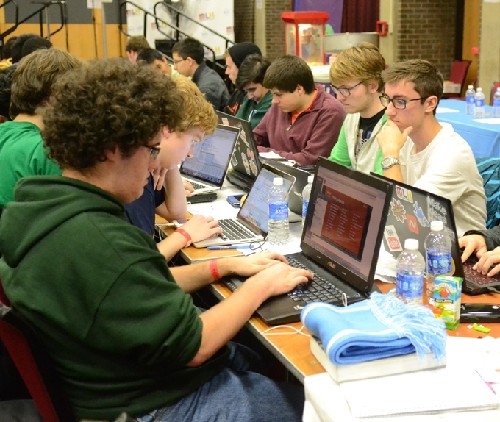Rutgers Grad’s Major League Hacking Startup Provides Platform for College Hackathons

The New Jersey Institute of Technology, in Newark, held a hackathon this weekend for its students and for college students from out of state. About 100 undergraduates participated in the hackathon, co-hosted by NJIT’s College of Computing Sciences and the Association for Computing Machinery.
Participants were allowed to use any open-source frameworks of their choosing, such as AngularJS or Bootstrap, as well as any third-party APIs (application program interfaces), such as Twitter’s API. The top three winners were awarded cash prizes: $1,500 for first place, $1,000 for second place and $500 for third place.
On a much larger scale, over the weekend of Oct. 11-12, some 800 students came to Rutgers University’s College Avenue Student Center for HackRU. At that hackathon, there were students from as far away as McMaster University, in Hamilton, Ontario. (See story here.)
This fall’s Hack Princeton will take place Nov. 14-16. NJTechWeekly.com published this story about the spring event, which drew several hundred participants.
What do these hackathons have in common? The backbone for each is a platform by Major League Hacking, which bills itself as the official student hackathon league.
As it happens, Major League Hacking’s founder is 2012 Rutgers grad Mike Swift, who grew up in Morris Plains, went to high school in Morristown and now lives in Brooklyn.
Swift founded Major League Hacking about a year ago. His previous company, Hacker League, which he created with Rutgers grads Abe Stanway and Ian Jennings, was acquired by Intel’s API management company, Mashery, for an unreported sum. Intel apparently acquired Hacker League to beef up its events for developers.
“I started Major League Hacking last fall,” Swift said in an interview. “I launched with five events,” and Rutgers was one of them … This was something I was doing with my time while I was going through the acquisition. The next thing I knew I had 30 events going,” with thousands of participants.
The reason the idea has taken off, Swift believes, is that there is continuity in quality at each of the hackathons.
“We bring the latest and greatest hardware for the participants to use. We have fun activities during the event. Most students, who are the primary organizers of these events, have never organized a 100-person event, much less a 1,000-person event.”
MHL is there in the background, making sure that everything goes smoothly and that the attendees all have a good experience, Swift said. Swift serves as the “commissioner,” although he is bringing on a new commissioner this spring.
MHL creates a level playing field among the hackathons at various colleges, as well as an enriched environment for the participants at each event. The league connects the students with technologies and mentors lined up by MHL. At Rutgers, for example, MLH provided free domain names from sponsor NameCheap and hardware from other sponsors, among them Dell, which provided XPS laptops and all-in-ones, and Alienware, which provided cutting-edge gaming tables and other hardware.
Besides the prizes offered by the sponsors, students who participate in the hackathons win points that get them into the MLH Standings. As the company describes it, over the fall semester, student competitors are seeking to earn points at hackathons in the U.S., Canada and in the U.K. to help their colleges advance in the rankings in order to win Major League Hacking glory at the end of the year, in the form of the MLH Hacker Cup.
The events are also an opportunity for the companies that sponsor them to recruit top participants as employees, an MHL spokesman said. They operate as a sort of “career fair” where sponsors can see their prospects at work.
“The fact that these companies are coming out and supporting this kind of event at Rutgers shows that the companies are finally catching on to all the amazing stuff that is going on there,” the spokesman said.
Swift had some kind words for the first-place winner of the recent HackRU hackathon, Arduino Unity3D Powerglove, a glove that lets the user use his or her hand movements as control inputs, as described by the Daily Targum.
“It’s amazing how hard the people who come here work … This team literally cut the elastic off of their socks to make this work,” he said.

